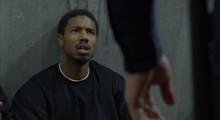6583 Results for “production”
-
Look Your Customers in the Eye

Independent filmmaker Brian Paul is a man who lives his films. In that spirit, he has taken DIY film distribution to a whole new level. Street level, that is. For the past two years, Paul has made a comfortable living by selling his hybrid film Cure for the Crash…The Art of Train Hoppin’ directly from art market street stalls in New Orleans. His unique distribution strategy has proved remarkably successful. Paul claims to have sold thousands of DVDs of Cure for the Crash by personally engaging more than 100,000 people face-to-face. “When I was a teenager in West Philly,” Paul […]
by Pauldevlin on Apr 23, 2013 -
Should Documentary Filmmakers Learn to Code?

A decade ago, the question would have seemed outlandish, but today, interactive documentaries have established themselves as a small, but growing, genre. Born out of experimentation, interactive docs are at once hard to define and easy to recognize. Some look like films and some don’t, but all draw on the language of cinematic storytelling, even though they’re native to tablets, mobile phones and the Web. Inspired by the impact of emerging technologies on nonfiction storytelling, MIT’s Comparative Media Studies department launched the Open Documentary Lab last March. As our team at the MIT OpenDocLab mapped the field and connected with […]
by Katie Edgerton on Apr 23, 2013 -
The Invisible Filmmakers

Black films don’t travel. It’s one of the oldest clichés in the movie business. And it may be as true today as it was 20 years ago when producer Andrew Vajna famously declared, “There are no black actors today [who] mean anything to the foreign marketplace.” Hollywood may have made some headway in overcoming the racial road-blocks that exist in overseas markets; the foreign box-office for Quentin Tarantino’s Jamie Foxx-starring Django Unchained, for example, has well surpassed domestic sales, as did, surprisingly, Martin Lawrence’s 2011 comedy Big Mommas: Like Father, Like Son. But those films remain the exception, not the […]
by Anthony Kaufman on Apr 23, 2013 -
Frame of Reference

What does it mean, in 2013, to photograph — to reproduce — a painting? Does it, as Walter Benjamin wrote in his 1936 essay “The Work of Art in the Age of Mechanical Reproduction,” drain the painting of an essential “aura,” even as it makes the image itself accessible to a much larger audience? Does it, as John Berger elaborated in his 1972 book and television program, Ways of Seeing, alter the painting’s meaning, rendering the original a symbol of capitalist exchange? Or, in today’s image-sharing world of Tumblr, is reproduction nothing more than whimsical statement of affinity, of a […]
by Scott Macaulay on Apr 23, 2013 -
Secrets of the Glam Squad: Inside the World of Film Hair and Makeup Departments

You’re the producer of a low-budget movie, and, as usual, there isn’t enough money. Each department is straining against their budgets, and you don’t want the production value of the film to falter. So you are forced to prioritize. More lights? Well, that’s hard to argue with — the movie has to look good. Another van? No way around that; you have to get people to the next location in time. But makeup and hair needs a space heater? Um … can’t they just put on sweaters? “If the electric department says they need two hours, no one questions it,” […]
by Alicia Van Couvering on Apr 23, 2013 -
Caught On Film

In Medan, Indonesia, when the government was overthrown by the military in 1965, Anwar Congo was one of many small-time gangsters who hawked movie tickets and plotted petty crimes in front of cinemas showing American movies. He and his buddies, who translate “gangster” as meaning “free men,” were enlisted as death squads after Communists cut off imports of U. S. films, such as their beloved Elvis Presley musicals. More than a million intellectuals, ethnic Chinese and alleged Communists and leftists were murdered. The “movie theater gangsters” were always eager to dance across the road to garrote an alleged Communist or […]
by Ray Pride on Apr 23, 2013 -
Five Questions with Bluebird Director Lance Edmands

Bluebird, Lance Edmands’s quietly disquieting directorial debut, follows a cast of characters in rural Maine, where every good intention is rendered fruitless in the face of a tragic accident. Lesley (Amy Morton), the local school bus driver, passes over a sleeping student at the end of her shift, leaving him to freeze into a coma overnight. The boy’s drifting, negligent young mother, Marla (Louisa Krause), seeks solace in the possibility of a lawsuit, and distraction in a dalliance with her co-worker, while her own mother monitors the child’s health in the hospital. Lesley’s husband, Richard (John Slattery), is an inch […]
by Sarah Salovaara on Apr 23, 2013 -
Five Questions with Let The Fire Burn Director Jason Osder

Founded in 1972, the Philadelphia-founded black liberation group MOVE Organization (the capitals break down into an acronym) preached a return to nature, annoying their neighbors by having bullhorns broadcast their beliefs all night and letting garbage fester in their yard. On May 13, 1985, Wilson Goode — the city’s first black mayor — approved dropping a bomb on their house as part of an eviction effort. 11 MOVE members died, including 5 children, and destroyed 61 houses. Jason Osder’s documentary feature debut Let The Fire Burn resurrects the incident almost exclusively through archival footage of TV broadcasts, home movies and […]
by Vadim Rizov on Apr 19, 2013 -
25 Picks for the 2013 Tribeca Film Festival

In the world of film festivals, “12” isn’t a particularly notable number. “Ten” — connoting if not institutional status than at least permanent residence — has come and gone. So too the after party of “11.” “Twelve” should just be rolling along, business as usual, dependent more on the quality of that year’s cinema than anything else. So, while it would be a stretch to say that Tribeca has reinvented itself for its twelfth edition, which opens today, I can’t help but note that something seems pleasantly different. Maybe it’s the lack of celebrity bloat — gone are the tin-ear […]
by Scott Macaulay on Apr 18, 2013 -
Five Questions for The Genius of Marian Directors Banker White and Anna Fitch

Banker White’s first feature, Sierra Leone’s Refugee All Stars, followed the titular group of musicians from a refugee camp in Guinea to their home and back again; his second feature, The Genius of Marian, is much closer to home. After his mother was diagnosed with early onset Alzheimer’s, White came back home to help with caretaking. In 2009 he began shooting conversations with his mother for therapeutic purposes, eventually realizing he was working on his next project. Shot over three years, the resulting film was co-directed by White’s wife (then-girlfriend) Anna Fitch. Arriving in New York in advance of the […]
by Vadim Rizov on Apr 18, 2013










